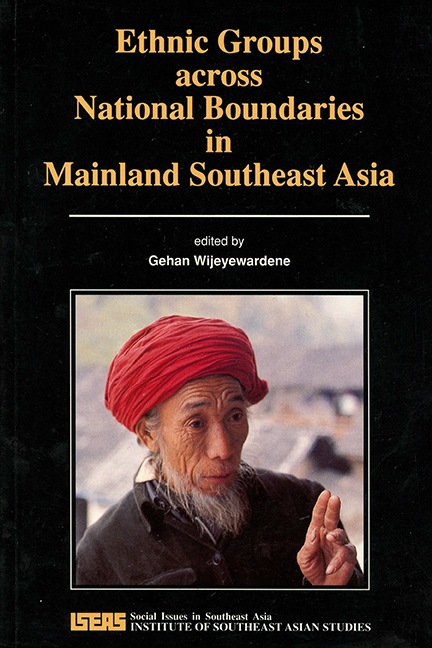Book contents
- Frontmatter
- Contents
- Foreword
- Contributors
- Acknowledgements
- 1 Introduction: Definition, Innovation, and History
- 2 Language and Ethnicity: The Mon in Burma and Thailand
- 3 Thailand and the Tai: Versions of Ethnic Identity
- 4 A Comparative Study of Structure and Contradiction in the Austro-Asiatic System of the Thai-Yunnan Periphery
- 5 Ethnicity, Nationalism, and the Nation-State: The Karen in Burma and Thailand
- 6 Capitalism and the Structure of Yao Descent Units in China and Thailand: A Comparison of Youling (1938) and Pulangka (1968)
- 7 Squatters or Refugees: Development and the Hmong
- 8 Afterword: “Ethnicity” and Anthropology
- Index
- THE EDITOR
3 - Thailand and the Tai: Versions of Ethnic Identity
Published online by Cambridge University Press: 21 October 2015
- Frontmatter
- Contents
- Foreword
- Contributors
- Acknowledgements
- 1 Introduction: Definition, Innovation, and History
- 2 Language and Ethnicity: The Mon in Burma and Thailand
- 3 Thailand and the Tai: Versions of Ethnic Identity
- 4 A Comparative Study of Structure and Contradiction in the Austro-Asiatic System of the Thai-Yunnan Periphery
- 5 Ethnicity, Nationalism, and the Nation-State: The Karen in Burma and Thailand
- 6 Capitalism and the Structure of Yao Descent Units in China and Thailand: A Comparison of Youling (1938) and Pulangka (1968)
- 7 Squatters or Refugees: Development and the Hmong
- 8 Afterword: “Ethnicity” and Anthropology
- Index
- THE EDITOR
Summary
In the first instance this paper is concerned with speakers of what Li Fang-kuei classifies as southwestern Tai. Most speakers of these languages refer to themselves as “Tai” (or a cognate); the Lao are an important exception. The word “Thai” is today generally used for citizens of the Kingdom of Thailand, and more specifically for the “Siamese”. In English “Tai” is used for speakers of a language of the Tai family. “Dai” is the pinyin spelling of this word, and is used by the Chinese for speakers of the southwestern branch of languages living in China (and some others where relevant). “Tai jai” (Greater Tai) is a term usually applied to the people also known as “Shan”, and should probably include the Ahom and other Tai groups of Assam. The associated term is “Tai noi” (Lesser Tai) used to include, probably, all others in the southwestern branch. These are “Tai” terms and appear not to have superogatory or derogatory implications. The Lao, certainly today, use this term (Lao) for themselves — but there is evidence they also use the word “Tai” — meaning “native” or “inhabitant”. It is Professor Xie Yuan Zhang's hypothesis that the “original” meaning of the word “Tai” was “person” and not “free”, as it is held to mean today. He suggests the earliest source of its use in the latter sense is by van Vliet in the seventeenth century.
As the title of this paper suggests, it has to do with the Kingdom of Thailand and its relations with its Tai-speaking neighbours. “Kingdom of Thailand” implies its people as well as its government.
There are three background issues against which this paper is conceived. The first is the academic issue of the history of the peoples and languages concerned. The resolution of this issue is a formidable task, admittedly of great interest, but, some have suggested, essentially intractable. The second is the political questions associated with Thai irredentism and accusations of Greater Thai hegemonism. Some discussion is directed towards this issue.
- Type
- Chapter
- Information
- Ethnic Groups Across National Boundaries in Mainland SEA , pp. 48 - 73Publisher: ISEAS–Yusof Ishak InstitutePrint publication year: 1990



